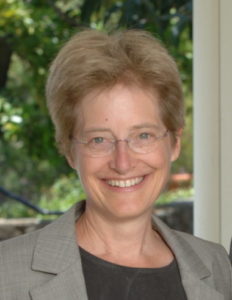
Ann Taves is Professor of Religious Studies and holder of the Virgil Cordano OFM Chair in Catholic Studies at the University of California at Santa Barbara, a position she has held since 2005. Previously she taught at Claremont School of Theology and Claremont Graduate School. Her major publications include Religious Experience Reconsidered: A Building Block Approach to the Study of Religion and Other Special Things (Princeton University Press, 2009), which received the 2010 Distinguished Book Award from the Society for the Scientific Study of Religion, and Fits, Trances and Visions: Experiencing Religion and Explaining Experience from Wesley to James (Princeton, 1999), which received the Outstanding Professional and Scholarly Book Award in Philosophy and Religion from the Association of American Publishers in 2000. Ann is currently working on a book titled "Revelatory Events: Experience and Appraisal in the Emergences of New Spiritual Paths" and directing the Religion, Experience, and Mind Lab at UCSB.
In this bumper episode of AYMD, Ann Taves talks to David Robertson about how she makes time to write, explanation versus interpretation, the metaphysics of mind, 'special things' in other disciplines, and what she has changed her mind about.
Ann Taves joins us to discuss her work arguing that we should study religions under the broader rubric of "worldviews" and "ways of life". This ambitious interdisciplinary project aims to place a micro-level analysis of individual worldviews into a broader evolutionary perspective.
Whether Luhrmann's approach is "too cognitive" depends on how cognitive is defined. There is a narrow and a broader sense in which the term is used. As I have responded to Tanya Luhrmann’s book elsewhere and am on record in terms of thinking it makes a major contribution to the cognitive science of religion (CSR) both in terms of its argument and its use of mixed (ethnographic and experimental) methods, I decided that rather than recycling comments that I have already made,...
In this second part we ask "the epistemic/ontological question": in studying these experiences, how far should we be concerned with the ontology? Would to do so be an abandonment of the scientific materialism which underpins the discipline, and therefore a slide back into theology? Or can there be a bigger model of materialism - a "complicated materialism", to use Ann Taves' expression - in which these phenomena might be suitably explicable?
In October 2013, a four day international conference was held at the Esalen Institute in Big Sur, California, on the theme of ‘Anthropology and the Paranormal’. This special two part episode explores some aspects of the sometimes fraught relationship between "paranormal" events and beliefs (The World Religions")...
In this wide-ranging interview (our 50th!), Ann Taves and David Wilson discuss the concept of religious experience. Taves challenges traditional models of religious experience, rejecting both an essentialist approach with a sui generis category and a constructivist approach which accepts only discourses. Instead, she argues that not only can we examine unusual experiences in themselves, ...
This work is licensed under a Creative Commons Attribution- NonCommercial- NoDerivs 3.0 Unported License.
The views expressed in podcasts, features and responses are the views of the individual contributors, and do not necessarily reflect the views of The Religious Studies Project or our sponsors. The Religious Studies Project is produced by the Religious Studies Project Association (SCIO), a Scottish Charitable Incorporated Organisation (charity number SC047750).